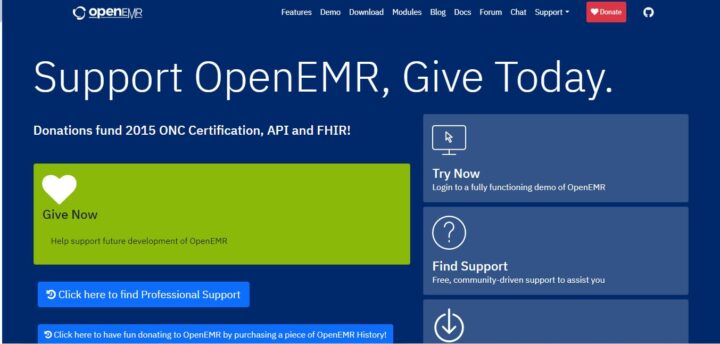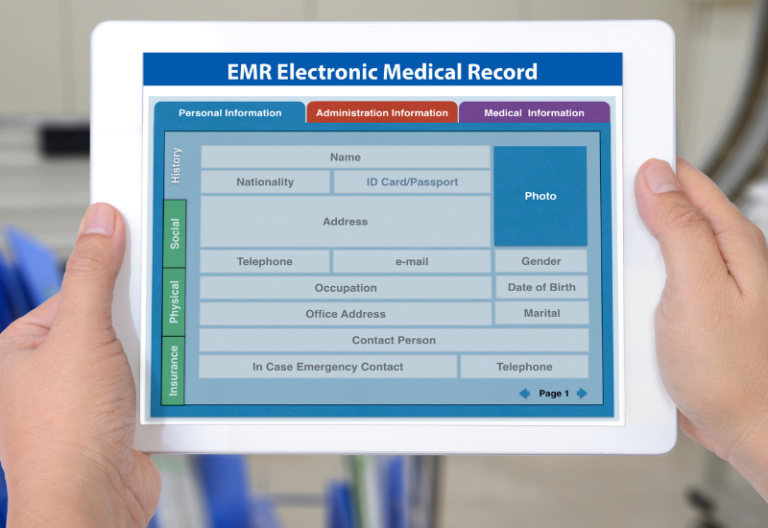The main difference between OpenEMR and Practice Fusion is that OpenEMR is an open-source platform that runs on-premise or in the cloud. Meanwhile, Practice Fusion operates on a subscription model and runs on the web.
This OpenEMR and Practice Fusion comparison should help you decide which EMR system is better for your medical practice.
Table of Contents

Introduction to OpenEMR and Practice Fusion
What Is OpenEMR?
OpenEMR is an open-source, ON 2015-certified, interoperable electronic medical record system with practice management features. As an open-source software, OpenEMR is completely free for medical practices. It integrates scheduling, e-prescribing, billing, labs, and CMS reporting in its platform.
What Is Practice Fusion?
Practice Fusion EHR is a web-based ONC-certified EMR system designed for various specialties, including internal medicine, pediatrics, family medicine, and primary care. It provides useful functionalities like charting, documentation, a patient portal, electronic prescriptions, laboratory orders, imaging, scheduling, and billing.
OpenEMR versus Practice Fusion EMR Features
Navigation and user interface
OpenEMR has a clean and user-friendly design. Despite this, hiring a consultant or a third-party vendor who can train your staff would be best, especially if your goal is to maximize efficiency and ensure the proper utilization of its functionalities.
Similarly, Practice Fusion’s interface is easy to use. You can quickly grasp the layout and navigation features with basic computer skills or if you have prior experience with other EMR systems.

Deployment
OpenEMR can run on-premise or in the cloud. You can use it on Windows, Mac, Linux, or as a web-based platform. As an on-premise solution, you can run it on your own servers. On the other hand, Practice Fusion is solely web-based.
Integration capabilities
OpenEMR’s features include Fast Healthcare Interoperability Resources (FHIR), a standard for exchanging healthcare data in a web-friendly format. It can communicate with diverse IT healthcare systems such as EHRs and HIEs. Since it is open-source, it allows for community collaboration and customization, which can enhance the interoperability of OpenEMR with other software.
Similarly, Practice Fusion is an interoperable system. It integrates with over 600 companies, including laboratories, pharmacies, health systems, and applications like AdvancedMD, Surescripts, and UpDox.
Training and support
Practice Fusion offers on-demand training, live webinars, and free EMR tutorials. It guides users on how to use e-prescriptions, patient intake forms, superbills, messaging, appointments, and other software functionalities. It also provides a ticketing system and free US-based phone and live chat support. Support via phone and live chat is available only on weekdays.
OpenEMR offers free support through chat, OpenEMR Project Wiki, and its online forum. Chat support is also available through Signal, Slack, Quiet Chat, and Telegram. However, the support team may take time to respond. OpenEMR also recommends hiring third-party professional support vendors to guide you in using the platform.

Security and Compliance
Practice Fusion is a HIPAA-compliant platform that uses biometric security, data backups, continuous monitoring, and SSL/TLS encryption.
Likewise, you can set up OpenEMR to ensure compliance with HIPAA requirements. However, the HIPAA Journal reports that multiple vulnerabilities were identified in OpenEMR. The software has since released patches to address these vulnerabilities.
Pricing and Cost
Practice Fusion costs $149 per provider per month. Availing the cloud-based EHR requires paying for an annual subscription, which is billed monthly. You can also purchase provider licenses for your needs. A single-provider license allows one provider to use EHR features and includes three signing staff and unlimited non-signing staff. You can also utilize the free 14-day trial to explore the platform.
Meanwhile, OpenEMR is entirely free. However, you might need to pay for IT staff, third-party support vendors, or consultants to conduct the training and maintain the system. In this aspect, no software is truly free, but you can save on costs while benefiting from the open-source EMR’s ability to find and fix security issues quickly.
Which Is Better: OpenEMR vs Practice Fusion?
The choice between OpenEMR and Practice Fusion depends on your requirements. OpenEMR’s main advantage is that it is open source, which means it is free and customizable. Practice Fusion may not be able to offer the same level of customization. Another advantage is that the possibilities for developing OpenEMR are endless as long as it gains continued community support.
Practice Fusion’s system, on the other hand, offers better security. While it costs you more, you also get your money’s worth. You should be able to expect timely responses and real-time guidance for your queries. It also does not depend on donations for certifications and continued development. Moreover, the cloud-based EHR can act as a business associate to a covered entity under HIPAA. This attests to its capability and willingness to prioritize patient privacy.







